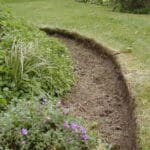Did you know vinegar, a common household item, effectively kills weeds between pavers?
But before you pour it on, there are important considerations to remember.
Understanding the best types of vinegar, the proper application techniques, and the safety precautions can significantly improve the outcome.
Stay tuned to discover the dos and don’ts of using vinegar as a weed killer for those stubborn pavers.
Key Takeaways
- Vinegar effectively kills weeds between pavers by drying them out with its acetic acid content.
- Select the appropriate vinegar type based on the severity of weed growth between pavers.
- Apply vinegar directly on weeds, avoiding contact with surrounding vegetation for safe and targeted treatment.
- Regular reapplication of vinegar may be needed for long-term control of weeds between pavers.
Benefits of Using Vinegar for Weed Control

When tackling weed control, using vinegar offers a natural and effective solution. Vinegar is a versatile ingredient that can be found in most households, making it a convenient option for weed-killing. Its acetic acid content is a desiccant, drying out the weeds and inhibiting their growth.
Unlike synthetic herbicides, vinegar is eco-friendly and safe for the environment, pets, and children. This makes it a popular choice for those looking to avoid harsh chemicals in their garden maintenance routine. Additionally, vinegar is cost-effective, as it’s relatively inexpensive compared to commercial weed killers.
Another benefit of using vinegar for weed control is its rapid action. When applied directly to the weeds, vinegar can show results within hours, making it a quick and efficient solution for unwanted plants in your pavers. Its effectiveness against many weed types further adds to its appeal. Overall, incorporating vinegar into your weed control regimen can help you maintain a weed-free outdoor space without the need for harmful chemicals.
Types of Vinegar for Weed Killing
To explore the effectiveness of vinegar for weed control in your pavers, it is crucial to understand the various types of vinegar available for this purpose. When killing weeds between pavers, not all vinegars are created equal. White vinegar is the most commonly used vinegar for weed killing, and it typically has an acetic acid concentration of around 5%. While white vinegar is effective for light weeding, it may not be as potent for tougher weeds or larger areas.
For more stubborn weeds, horticultural vinegar, also known as horticultural-grade vinegar, is a better option. This type of vinegar contains a higher concentration of acetic acid, usually around 20%, making it more powerful for weed control. However, horticultural vinegar is stronger and should be handled cautiously as it can cause skin irritation and harm desirable plants if not used carefully.
In addition to white vinegar and horticultural vinegar, there are also options like apple cider vinegar or industrial-grade vinegar. These variations may have different concentrations of acetic acid, so selecting the type that best suits your weed-killing needs between pavers is crucial.
Preparation and Application Techniques
For effective weed control between vinegar pavers, guarantee thorough weed coverage with the vinegar solution. To guarantee you’re properly prepared to tackle those pesky weeds, follow these steps:
- Mixing the Solution: Create a vinegar solution by mixing white vinegar with water. A ratio of 1 part vinegar to 1 part water is commonly recommended for effective weed-killing properties.
- Application Technique: Use a spray bottle or a garden sprayer to apply the vinegar solution directly onto the weeds. Be careful not to spray the solution on surrounding plants or grass, as vinegar can also harm them.
- Timing and Frequency: Apply the vinegar solution on a sunny day when there’s no forecast of rain for at least 24 hours. For more stubborn weeds, you may need to reapply the vinegar solution every few days until the weeds are completely eradicated.
Safety Precautions When Using Vinegar
Guarantee your skin and eyes are adequately protected when handling vinegar for weed control between pavers. Vinegar, especially in higher concentrations, can irritate the skin and eyes. Before starting the weed control process, wear protective gear such as gloves, long-sleeved clothing, and safety goggles to prevent any contact with the vinegar solution. In case of accidental exposure, immediately rinse the affected area with water and seek medical attention if irritation persists.
Additionally, when applying vinegar between pavers, be cautious of surrounding plants. Vinegar can be non-selective, meaning it may harm desirable vegetation along with the weeds. To prevent unintended damage, consider using a spray bottle or a controlled application method to target only the weeds growing between the pavers. This focused approach helps minimize the risk of harming other nearby plants.
Effectiveness and Long-Term Results
When using vinegar to kill weeds between pavers, expect to see noticeable results within a few days of application. The effectiveness of vinegar as a weed killer is well-documented, but understanding the long-term results is important for maintaining a weed-free pathway or patio.
Here’s what you can expect:
- Initial Wilting: Initially, the weeds between your pavers will wilt and turn brown within a day or two of applying vinegar. This visual indication shows that the vinegar is starting to work on the weeds’ foliage.
- Gradual Decay: As days pass, the weeds will continue to decay, with some becoming mushy. This decay is a sign that the vinegar penetrates the weed’s roots and inhibits its growth.
- Long-Term Prevention: While vinegar can effectively kill existing weeds between pavers, it may not prevent new weeds from sprouting. To ensure long-term results, consider reapplying vinegar periodically or exploring additional weed prevention methods.
Frequently Asked Questions

Can Vinegar Be Used to Kill Weeds in Between Pavers Made of Different Materials, Such as Concrete, Brick, or Stone?
Vinegar can be effective when dealing with weeds between pavers made of various materials, such as concrete, brick, or stone. Vinegar’s acetic acid content can help eliminate weeds without harming the environment.
However, be cautious as vinegar may also affect surrounding plants. To apply, simply pour vinegar directly onto the weeds and repeat as needed to prevent regrowth. Remember to take safety precautions when using vinegar to avoid skin or eye irritation.
Will Vinegar Harm Surrounding Plants or Grass if It Comes Into Contact With Them During the Weed-Killing Process?
Be cautious around surrounding plants or grass when using vinegar to kill weeds between pavers. Approximately 82% of household vinegar is typically 5% acetic acid, which can harm vegetation.
To prevent damage, apply vinegar directly to weeds on a sunny day when rain isn’t expected for at least 24 hours. Shield nearby plants with a barrier like cardboard and avoid overspray or runoff to keep your garden thriving.
How Long Does It Take for Vinegar to Fully Kill Weeds Between Pavers, and Is There a Specific Time of Day That Is Best for Application?
To effectively kill weeds between pavers using vinegar, it usually takes a few days for the weeds to wither and die.
The best time to apply vinegar is on a sunny day when no rain is expected for at least 24 hours. This allows the vinegar to penetrate the weeds properly.
Remember to be cautious, as vinegar can harm surrounding plants if it comes into contact with them.
Are Any Specific Weather Conditions or Temperatures Optimal for Using Vinegar as a Weed Killer Between Pavers?
Remember that ideal weather conditions can boost vinegar’s effectiveness as a weed killer between pavers. Aim for a sunny day with temperatures above 70 degrees Fahrenheit. The warmth helps the vinegar penetrate the weeds more efficiently.
Also, avoid applying vinegar if rain is expected within 24 hours, as it can wash away the solution before it can do its job.
Can Vinegar Be Used as a Long-Term Solution for Preventing Weed Growth Between Pavers, or Will Weeds Eventually Return Over Time?
To prevent weed growth between pavers in the long term, consider that vinegar can be effective initially, but weeds may return over time. Regular maintenance and reapplication may be needed for continual control.
Final Words
Table of Contents
So, will vinegar kill weeds between pavers? Absolutely!
You can effectively eliminate unwanted plants without harmful chemicals by using vinegar as a natural weed killer.
For example, Sarah from Ohio tried vinegar on her patio pavers and saw a significant reduction in weeds within a few days.
Give it a try, and say goodbye to those pesky weeds for good!




